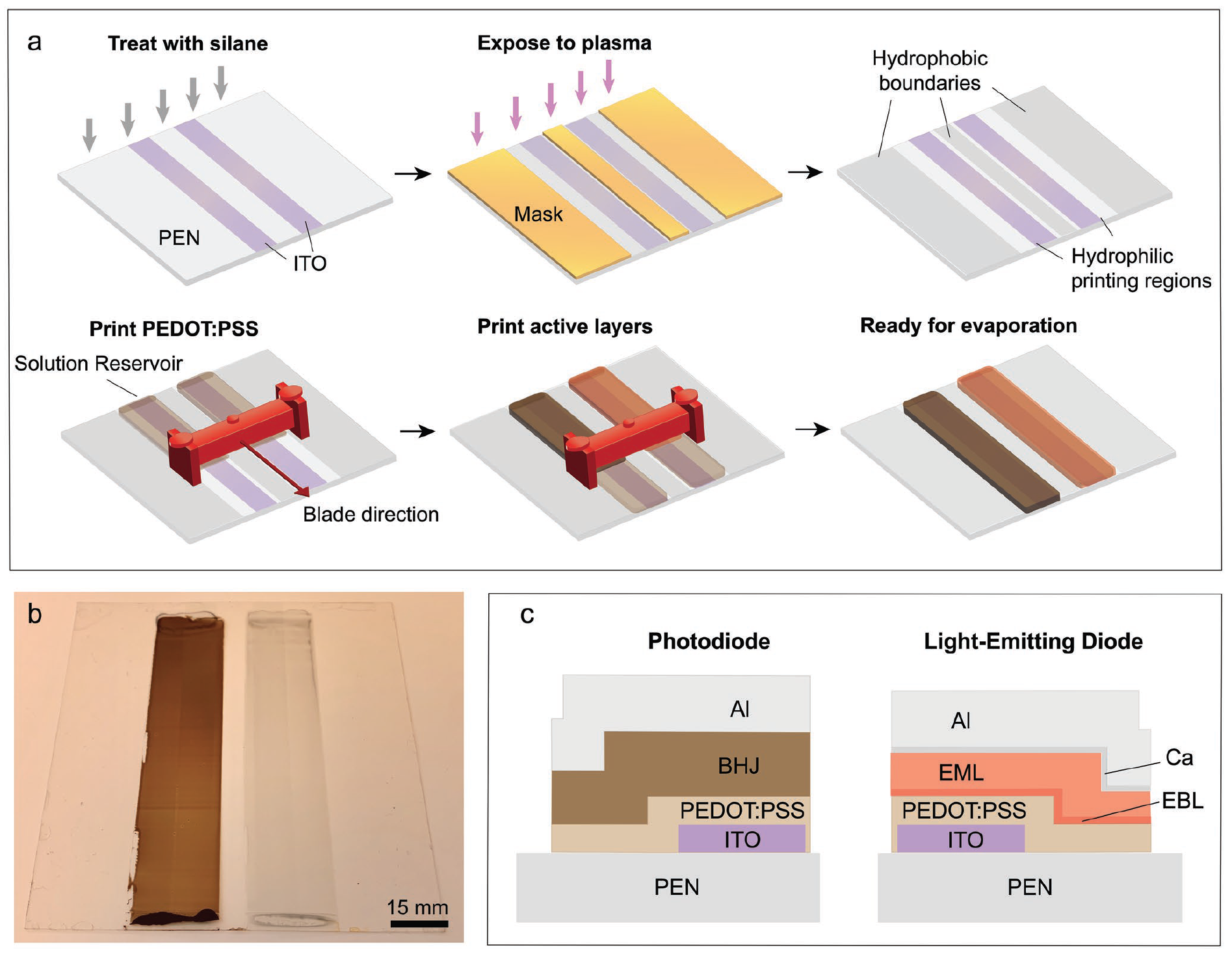Jasmine and Juan’s paper in Advanced Materials!
Paper title: Flexible Blade-Coated Optoelectronic Devices: Dual Functionality via Simultaneous Deposition
Abstract: Advances in printing techniques have enabled a new generation of low-cost and large-area flexible electronics. However, in applications where a combination of printed components is required, multiple fabrication processes and subsequent integration can be complex and time consuming. Additionally, these applications require devices to be stacked atop each other, reducing overall mechanical flexibility. In this work, surface-energy-patterning (SEP) is used to enable simultaneous blade coating of organic photodiode (OPD) and organic light-emitting diode (OLED) films side-by-side. The result is dual functionality on a single flexible substrate. Various active layer solution concentrations are investigated to optimize active layer thicknesses and consequently optimize the performance of each device. A peak spectral responsivity of 0.33 A W−1 at 800 nm is achieved for optimized OPDs and a maximum luminance of 7000 cd m−2 is achieved for optimized OLEDs at an applied bias of 8 V. Overall, this technique enables the printing of two functionally distinct devices in a single step without compromising the performance of either device.
Publication:
-

Flexible Blade-Coated Optoelectronic Devices: Dual Functionality via Simultaneous Deposition
Jasmine Jan,
Juan Zhu,
Jonathan Ting,
and
Ana C. Arias
Advanced Functional Materials,
2022
,
.
[Abstract]
[Bibtex]
[PDF]
Advances in printing techniques have enabled a new generation of low-cost and large-area flexible electronics. However, in applications where a combination of printed components is required, multiple fabrication processes and subsequent integration can be complex and time consuming. Additionally, these applications require devices to be stacked atop each other, reducing overall mechanical flexibility. In this work, surface-energy-patterning (SEP) is used to enable simultaneous blade coating of organic photodiode (OPD) and organic light-emitting diode (OLED) films side-by-side. The result is dual functionality on a single flexible substrate. Various active layer solution concentrations are investigated to optimize active layer thicknesses and consequently optimize the performance of each device. A peak spectral responsivity of 0.33 A W−1 at 800 nm is achieved for optimized OPDs and a maximum luminance of 7000 cd m−2 is achieved for optimized OLEDs at an applied bias of 8 V. Overall, this technique enables the printing of two functionally distinct devices in a single step without compromising the performance of either device.
@article{Jasmine_parallelfab,
author = {Jan, Jasmine and Zhu, Juan and Ting, Jonathan and Arias, Ana C.},
title = {Flexible Blade-Coated Optoelectronic Devices: Dual Functionality via Simultaneous Deposition},
year = {2022},
doi = {https://doi.org/10.1002/adfm.20211234},
publisher = {Wiley Online Library},
url = {https://onlinelibrary.wiley.com/doi/abs/10.1002/adfm.202112343},
journal = {Advanced Functional Materials},
volume = {},
number = {},
thumbnail = {jasmine2022parallelfab.png},
pdf = {jasmine2022parallelfab.pdf}
}
 Flexible Blade-Coated Optoelectronic Devices: Dual Functionality via Simultaneous Deposition Advanced Functional Materials, 2022 , . [Abstract] [Bibtex] [PDF]
Flexible Blade-Coated Optoelectronic Devices: Dual Functionality via Simultaneous Deposition Advanced Functional Materials, 2022 , . [Abstract] [Bibtex] [PDF]